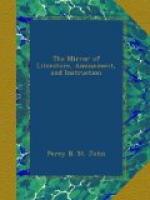Fairs, among the old Romans, were holidays, on which there was an intermission of labour and pleadings. Among the Christians, upon any extraordinary solemnity, particularly the anniversary dedication of a church, tradesmen were wont to bring and sell their wares even in the churchyards, which continued especially upon the festivals of the dedication. This custom was kept up till the reign of Henry VI. Thus we find a great many fairs kept at these festivals of dedications, as at Westminster on St. Peter’s day, at London on St. Bartholomew’s, Durham on St. Cuthbert’s day. But the great numbers of people being often the occasion of riots and disturbances, the privilege of holding a fair was granted by royal charter. At first they were only allowed in towns and places of strength, or where there was some bishop or governor of condition to keep them in order. In process of time there were several circumstances of favour added, people having the protection of a holiday, and being allowed freedom from arrests, upon the score of any difference not arising upon the spot. They had likewise a jurisdiction allowed them to do justice to those that came thither; and therefore the most inconsiderable fair with us has, or had, a court belonging to it, which takes cognizance of all manner of causes and disorders growing and committed upon the place, called pye powder, or pedes pulverizati. Some fairs are free, others charged with tolls and impositions. At free fairs, traders, whether natives or foreigners, are allowed to enter the kingdom, and are under the royal protection in coming and returning. They and their agents, with their goods, also their persons and goods, are exempt from all duties and impositions, tolls and servitudes; and such merchants going to or coming from the fair cannot be arrested, or their goods stopped. The prince only has the power to establish fairs of any kind. These fairs make a considerable article in the commerce of Europe, especially those of the Mediterranean, or inland parts, as Germany. The most famous are those of Frankfort and Leipsic; the fairs of Novi, in the Milanese; that of Riga, Arch-angel of St. Germain, at Paris; of Lyons; of Guibray, in Normandy; and of Beauclaire, in Languedoc: those of Porto-Bello, Vera Cruz, and the Havannah, are the most considerable in America.
HALBERT.
* * * * *
THE VIRGINAL.
(For the Mirror.)
A rare and beautiful relic of the olden time was lately presented to the museum of the Northern Institution, by William Mackintosh, Esq. of Milbank—an ancient virginal, which was in use among our ancestors prior to the invention of the spinnet and harpsichord. Mary, Queen of Scots, who delighted in music, in her moments of “joyeusitie” as John Knox phrases it, used to play finely on the virginal; and her more fortunate rival, Queen Elizabeth, was so exquisite




